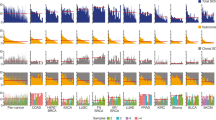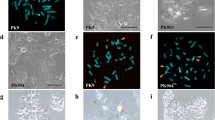Abstract
Breast, bladder, colon, and ovarian carcinomas show frequent low level 20q gain and less frequently high level 20q13.2 amplification, but the significance of these 20q amplifications in transformation has not been defined. Using karyotypic and comparative genomic hybridization (CGH) analyses, chromosome losses and gains were analysed in six newly immortalized human uroepithelial cell (HUC) lines transformed by Human Papillomavirus 16 (HPV16) E7. Results showed clonal chromosomes with 20q11->qter gain in all six lines. CGH revealed a peak of 20q13.2 amplification in two cell lines. FISH with whole chromosome 20 paint showed expanded chromosome regions (ECRs) and double minute chromosomes (DMs) that contained chromosome 20 material in cell lines with 20q13.2 amplification. FISH with probes from the center of the 20q13.2 human breast cancer amplicon showed as many as 24 signals in cells with 20q13.2 amplification. The acquisition of genome instability in these E7-HUCs did not correlate with TP53 mutation, as all E7-HUCs contained only wildtype TP53. These results suggest that low level 20q gain is associated with overcoming cellular senescence in E7 transformed cells (P-value=2×10−7), but does not confer genome instability, while high level 20q13.2 amplification is associated with chromosome instability. Loss of 10p (P-value=3×10−5) was also important in immortalization of E7-transformed HUCs. Thus, these results have profound implications for interpreting the significance of high versus low level 20q gains in human cancers.
This is a preview of subscription content, access via your institution
Access options
Subscribe to this journal
Receive 50 print issues and online access
$259.00 per year
only $5.18 per issue
Buy this article
- Purchase on Springer Link
- Instant access to full article PDF
Prices may be subject to local taxes which are calculated during checkout
Similar content being viewed by others
Author information
Authors and Affiliations
Rights and permissions
About this article
Cite this article
Savelieva, E., Belair, C., Newton, M. et al. 20q gain associates with immortalization: 20q13.2 amplification correlates with genome instability in human papillomavirus 16 E7 transformed human uroepithelial cells. Oncogene 14, 551–560 (1997). https://doi.org/10.1038/sj.onc.1200868
Received:
Revised:
Accepted:
Issue Date:
DOI: https://doi.org/10.1038/sj.onc.1200868
Keywords
This article is cited by
-
Increased AURKA promotes cell proliferation and predicts poor prognosis in bladder cancer
BMC Systems Biology (2018)
-
Immortalized N/TERT keratinocytes as an alternative cell source in 3D human epidermal models
Scientific Reports (2017)
-
Ubiquitin-conjugating enzyme complex Uev1A-Ubc13 promotes breast cancer metastasis through nuclear factor-кB mediated matrix metalloproteinase-1 gene regulation
Breast Cancer Research (2014)
-
Identification of prefoldin amplification (1q23.3-q24.1) in bladder cancer using comparative genomic hybridization (CGH) arrays of urinary DNA
Journal of Translational Medicine (2013)
-
High-resolution genomic profiling of human papillomavirus-associated vulval neoplasia
British Journal of Cancer (2010)



